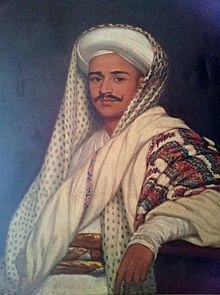Ranga Nath Poudyal Atreya (Nepali: रङ्गनाथ पौड्याल आत्रेय) popularly known as Ranganath Pandit was the Mukhtiyar of Nepal from 1837 December to 1838 August and in 1840 November for about 2–3 weeks. He was the first Brahmin Prime Minister of Nepal.
Pandit Raaj Ranga Nath Poudyal | |
|---|---|
पण्डित राज रङ्गनाथ पौड्याल | |
 | |
| 4th Mukhtiyar of Nepal | |
| In office 1837 December – 1838 August | |
| Preceded by | Rana Jang Pande |
| Succeeded by | Chautariya Pushkar Shah |
| In office 1840 November – 1840 November | |
| Preceded by | Rana Jang Pande |
| Succeeded by | Fateh Jung Shah |
| Personal details | |
| Born | Makhantole, Kathmandu |
| Nationality | Nepali |
| Parent | Panditraj Bajranath |
Early life
editRanga Nath Poudyal Atreya was born in 1773 A.D. at Makhantole Kathmandu to Pandit Brajnath Atreya, who was a prominent courtier in the palace who was later exiled to Benaras. He was a Bahun by ethnicity.[1] Ranga Nath Poudyal Atreya spent his childhood years in Benares, where he mastered Sanskrit. He was granted the title "Pandit Raj" by the then king of Benares.[2][need quotation to verify]
Political career
editRanga Nath Poudyal Atreya met Bhimsen Thapa in Benares (Varanasi). He was deeply influenced by Bhimsen Thapa and thus he forged his path to power by establishing himself as the prominent supporter of Bhimsen Thapa. After the execution of Mulkaji (Chief Kaji) Damodar Pande, Paudyal was appointed as Raj Guru (Royal Preceptor) along with Ranajit Pande as appointed as Mulkaji, Bhimsen Thapa as second Kaji and Sher Bahadur Shah as Mul Chautariya.[3][4] He became Prime Minister of Nepal at the time of utmost political turmoil. He is remembered as a clever Brahmin .[citation needed] Although he was the prominent supporter of Bhimsen Thapa[5] His political career was doomed after the downfall of Bhimsen Thapa. He is often characterized as the spiritual advisor of the court rather than a powerful governor.
Personal life
editNot much is known about his personal life. He is believed by many to be spiritual minded.
See also
editReferences
edit- ^ Raj 2006, p. 55.
- ^ Paudel, Baburam (2003). Paudel Bansalwali. Lalitpur: Jagadamba Press. p. 3.
- ^ Nepal 2007, p. 58.
- ^ Acharya 2012, p. 55.
- ^ Cocker, M, & Inskipp, C. (1988). A Himalayan ornithologist: The life and work of Brian Houghton Hodgson. Oxford: Oxford University Press. p. 129.
{{cite book}}: CS1 maint: multiple names: authors list (link)
Bibliography
edit- Acharya, Baburam (2012), Acharya, Shri Krishna (ed.), Janaral Bhimsen Thapa : Yinko Utthan Tatha Pattan (in Nepali), Kathmandu: Education Book House, p. 228, ISBN 9789937241748
- Nepal, Gyanmani (2007), Nepal ko Mahabharat (in Nepali) (3rd ed.), Kathmandu: Sajha, p. 314, ISBN 9789993325857
- Pradhan, Kumar L. (2012), Thapa Politics in Nepal: With Special Reference to Bhim Sen Thapa, 1806–1839, New Delhi: Concept Publishing Company, p. 278, ISBN 9788180698132
- Raj, Prakash A. (2006), Dancing Democracy: The power of a Third Eye, Rupa & Company, ISBN 9788129109460